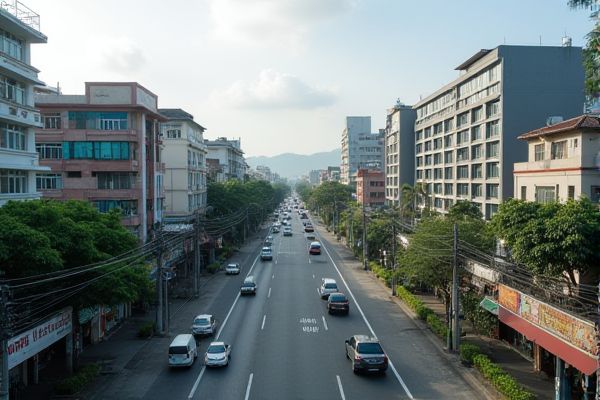
Education system and best schools in Indonesia: Indonesian education structure: Early childhood, primary, secondary, tertiary. Primary education: Required for ages 7-12 years. National curriculum: Emphasizes religion, Bahasa, science, and math. Secondary education: Divided into junior and senior high school. International schools: Popular in Jakarta, Bali, Surabaya. Accreditation levels: A, B, C; A being highest. National exams: Important for secondary school completion. Notable private schools: ACS Jakarta, Global Jaya International. Homeschooling: Growing trend among expatriates. Education Ministry: Governs public and private institutions.
Indonesian education structure: Early childhood, primary, secondary, tertiary.
In Indonesia, the education system is structured into early childhood education, including playgroup and kindergarten, followed by 12 years of compulsory education: six years of primary school, three years of junior secondary school, and three years of senior secondary school. For those interested in more information about the structure and governance of education in Indonesia, the Education in Indonesia page provides a comprehensive overview. Tertiary education is optional and includes various higher education institutions. The system is overseen by multiple ministries, including the Ministry of Education, Culture, Research, and Technology, and the Ministry of Religious Affairs.
Primary education: Required for ages 7-12 years.
In Indonesia, primary education is compulsory for children aged 7-12 years, lasting six years. It is provided by both public and private schools, with the majority of primary schools being public, and is supervised by the Ministry of Education, Culture, Research, and Technology.
National curriculum: Emphasizes religion, Bahasa, science, and math.
Indonesia's new national curriculum, known as the Emancipated Curriculum (Kurikulum Merdeka), is set to be implemented from July 2024, with a focus on improving education quality and enhancing teacher autonomy. While the curriculum does not specifically emphasize religion, it encompasses a range of subjects such as Bahasa Indonesia, science, and math. Notably, English is being reintroduced at the primary level starting from the 2024/25 academic year, thus marking a significant shift in the educational landscape.
Secondary education: Divided into junior and senior high school.
In Indonesia, secondary education is divided into Junior High School (Sekolah Menengah Pertama) and Senior High School (Sekolah Menengah Atas), with Junior High School being compulsory for three years. Senior High School lasts three to four years and offers both general and vocational programs. To learn more about the structure and specifics of these programs, you can visit the detailed article on the Secondary/High School Education System in Indonesia. This dual structure ensures a comprehensive educational experience where students can tailor their learning towards academic or practical goals, thus preparing them for diverse future pursuits.
International schools: Popular in Jakarta, Bali, Surabaya.
International schools in Indonesia are predominantly found in major cities like Jakarta, Bali, and Surabaya. In Jakarta, top schools include the British School Jakarta, Jakarta Intercultural School, and Independent School of Jakarta, offering curricula such as the British National Curriculum, American-based curriculum, and International Baccalaureate (IB) programs. Similar high-quality international schools are also available in Bali and Surabaya, catering to the educational needs of expat families. For detailed insights and a comprehensive list, visit Social Expat.
Accreditation levels: A, B, C; A being highest.
In Indonesia, the education system is divided into primary, junior secondary, senior secondary, and higher education levels, with compulsory education spanning 12 years. Schools are accredited by the government, but specific accreditation levels are not explicitly mentioned. Instead, the system is overseen by the Ministry of Education and Culture and the Ministry of Religious Affairs, with private schools also playing a significant role. For more insights on the subject, visit the comprehensive analysis provided by the Lowy Institute.
National exams: Important for secondary school completion.
National exams in Indonesia are a crucial component of the education system, mandated by Law No. 20/2003, and are used to evaluate students across the nation. Recent policies have shifted their primary role to serve as a standard evaluation system rather than as a determinant for graduation or university entrance. For a deeper understanding of these changes, you may refer to the comprehensive analysis available in this Journal Article, which provides valuable insights into the evolution and current implementation of national exams in Indonesia's education landscape.
Notable private schools: ACS Jakarta, Global Jaya International.
ACS Jakarta, established in 1996 as Sekolah Tiara Bangsa, is a selective K-12 school that became part of the Anglo-Chinese family of schools in 2006. It offers internationally recognized curricula, emphasizing holistic education and moral principles, and is the first overseas campus of the Anglo-Chinese School in Singapore. Meanwhile, Global Jaya School, founded in 1995, is a non-denominational international school offering the International Baccalaureate (IB) and Cambridge IGCSE curricula. It is accredited by the Western Association of Schools and Colleges and the IB Organisation, providing a quality international education while valuing Indonesian culture and international cultural awareness.
Homeschooling: Growing trend among expatriates.
Homeschooling in Indonesia is a growing trend among expatriates, legalized under the National Education System Act of 2003, offering flexibility, international curriculum options, and personalized learning. It is particularly appealing for families living far from international schools, with institutions like Jakarta Academics providing recognized and flexible educational models.
Education Ministry: Governs public and private institutions.
The Ministry of Primary and Secondary Education (Kemendikdasmen) in Indonesia governs both public and private institutions, overseeing early childhood, primary, secondary, and vocational education. It is responsible for managing educational policies, teacher training, and educational standards across these levels. With a structure that includes various directorates and agencies, the ministry ensures comprehensive education management. For more in-depth information on their functions and initiatives, you can visit their page on Wikipedia.
